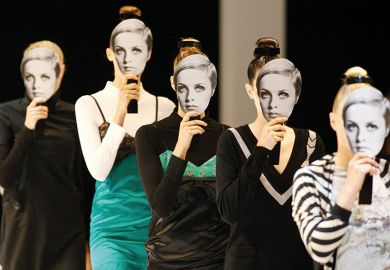As ever greater numbers of young scholars strain every sinew to establish a career in the academy, we thought it would be interesting to seek the perspectives of some senior academics who have already lived that dream. Was their lifetime of teaching and research everything they had hoped it would be? And what advice would they give their younger selves - or someone now entering the profession?
We hardly knew what to expect. Would we get tales of disappointment, missed opportunities and pointless feuds? Or has the academy offered our contributors lives full of stimulation and fun?
In the event, only one of our six contributors expresses regret that she didn’t leave the academy and do what she really wanted to. Another believes that academics belong - or, at least, belonged - to “one of the most privileged minorities on the planet”. A third recalls an “exciting quarter-century of academic warfare”, her only regret being that occasionally she had been led “to flatten someone who possibly didn’t deserve it”.
Several contributors offer different perspectives on the work-life balance. One found that his 24/7 job as the president of a US university was all consuming and now sees the wisdom of his children’s ways, “devoting more time to my grandchildren than I allowed myself to give to them”. Another regrets that the necessity of providing for a sick husband and four children forced her to take on “anything that paid”. But one contributor believes it is indeed possible for academics to “have it all” - although not necessarily at the same time.
Ask a group of academics for advice and you’ll always get contradictory responses. One of our contributors advises young scholars that “if you’re unexpectedly asked to lecture in Chile next week - go!” However, another takes a more cautious line: “Withdraw from the invited conference lecture in Chile and go to the job interview at Huddersfield.”
Perhaps only one suggestion ought to be engraved on tablets of stone: “Never turn down Times Higher Education when asked to write for them.”
Matthew Reisz
Work and home life for a university president is very difficult to untwine yet it is essential that one do so
Stephen Joel Trachtenberg

Stephen Joel Trachtenberg
Balancing act
There are two big-ticket items that come to mind when I look over the 40- plus years I have toiled in academic administration that I would alter if I could have had the wisdom of age running alongside the enthusiasm of youth.
Work and home life for a university president is very difficult to untwine yet it is essential that one do so. The job in the US is 24/7: it is the equivalent of being mayor of a small village and along with the title comes the responsibility for nearly 15,000 students (with raging hormones) living within the campus borders; close to 2,500 academic, professional, clerical and maintenance staff; and the interconnection between all those people and their neighbours whose homes and offices abut the university. Something happens all day and all night. My children saw less of me than I wished had been the case and now that I’ve seen how they are devoting more of their time to my grandchildren than I allowed myself to give to them, I’ve seen the wisdom of their ways.
Equally important is not to confuse the admiration of friendship with professional performance. By that I mean, keep your friends close to your heart but not on your payroll. Do not become friends with anyone who does not yet have tenure. You will lose your objectivity when it comes time to vote up or down. And do not hire your friends or relatives for jobs of consequence. I once asked a dean to step down from his position. He said to me: “I’m surprised. I thought we were friends.” With some sadness - for I knew the outcome - I replied: “You are the dean whose company I most enjoy over dinner but that is not the same as reviewing how you do your job.” It was years before we could share a bottle of wine together.
Stephen Joel Trachtenberg is president emeritus and university professor of public service at George Washington University. He was president between 1988 and 2007.
Understand that academics don’t see far beyond the ends of their noses until their own territory is threatened - at which point they become very fierce
G.R. Evans

G.R. Evans
Fight the good fight
I have a few regrets, but only little ones. These generally relate to occasions when I have flattened someone who possibly didn’t deserve it. But if you are going to avoid being flattened yourself in academe you have to fight hard.
My problems began when I chose the wrong Cambridge college and entered a C.P. Snow novel. A fellow there had recently been driven to the verge of suicide; after me, another left so traumatised that years later he could not bear to pass through Cambridge on a train.
Some of those who were in power had joined the college as undergraduates and never left. They made me admissions tutor because I had once taught in a school, but as an outsider with a University of Oxford degree, who had also taught in other universities, I never seemed to fit. So they drew up a lengthy list of trivial accusations such as failures to attend dinners, tried me in my absence and condemned me for lack of devotion to the college.
But this young Humpty-Dumpty had learned to put herself back together again. Besides, I had old-fashioned pre-1987 tenure in the university post. In the end I won because other fellows began to mutter that it would be them next.
Even after I resigned and joined another college, my enemies did not give up. The rancour all moved into my faculty and there followed my great battle for promotion, which hit the headlines and forced the university to change its procedures when the judge mentioned the sword of Damocles.
But I don’t regret my exciting quarter-century of academic warfare - not least because it all dovetailed rather nicely with my skills in Aristotelian logic and research into the goings-on in medieval universities. Both turned out to have more “impact” than you might expect.
I rummaged through the university statutes and got to know how its constitution worked. My regular speeches in the senate, published in the Cambridge University Reporter, seemed to acquire quite a readership. Staff and students all over the country began to ask for support so I learned about dispute-resolution, qualified as a barrister and am now leading the Improving Dispute Resolution Advisory Service.
But there are a few tips I wish someone had given the younger me. These include:
- Don’t start battles you can’t win and don’t expect to win every battle you start.
- If you are leading a deputation, look behind you. Where has everyone gone?
- Understand that academics don’t see far beyond the ends of their noses until their own territory is threatened - at which point they become very fierce.
- Hand the nasty letter you received around the committee table and watch sympathy swing your way.
- Talk to senior managers and administrators. They sometimes enjoy it. If they won’t talk, an emailed poser may tie them up for days.
Above all, those engaged in disputes should avoid being consumed by them. Defend your space for teaching and research, and, whatever happens, keep writing.
G.R. Evans is emeritus professor of medieval theology and intellectual history at the University of Cambridge.
Anyone bumping towards the final years of a long academic career should not have too many regrets…since we belonged to one of the most privileged minorities on the planet
Simon Blackburn

Simon Blackburn
Luck and good management
The paths not taken are notoriously hard to investigate in detail, so not knowing what their pitfalls were, I am apt to avoid regrets. And anyone bumping towards the final years of a long academic career should not have too many regrets in any case, since we belonged to one of the most privileged minorities on the planet. But I know I made choices that turned out well only because of extraordinary luck.
One was my PhD topic: I was interested both in the nature of reference, which is a topic in the philosophy of language, and also in the epistemological problem of induction, sometimes known as Hume’s problem of justifying extrapolations such as that from past to future. With my immaculate sense of fashion I concentrated on the latter, just as every other philosopher in the Western world dropped epistemology for the theory of reference, which was the hottest topic for the next 20 years. So I was courting exile and the dole queue, but, as luck had it, when a fellowship at Pembroke College, Oxford, became vacant the principal interviewer was A.J. Ayer, whose own career had revolved around epistemology, so things went well and I spent 20 happy years there.
Of those years the first 10 or so were as much about teaching, family and the open air as anything worth calling “research”. This was possible then, although a guardian angel might have told me to spend more time working in order to enter Oxford’s pantheon of the great and the good. But my angel’s omission made it easy to embark on a new and alarmingly productive phase of life in the US.
In the preface to his fine book The Mind and Its Place in Nature, the Cambridge philosopher C.D. Broad talked of retiring to his well-earned bath chair to watch his younger friends “‘dancing to the highly syncopated pipings of Herr Wittgenstein’s flute”. Thankfully, Broad did not carry out his threat. I am 30 years older than Broad was when he wrote that, but am still tempted to rise from my bath chair when the spirit moves, although happy to lounge in it when it does not.
Since I am retired from my university post, the research councils, funding councils and quality assurance police no longer gibber at me, as they continue to do at younger academics. So, currently, I think my luckiest accident was to have been born when I was.
Simon Blackburn is a fellow of Trinity College, Cambridge.
Just take every seemingly mad chance offered, whether you feel qualified or not
Angela Thody

Angela Thody
Find your voice
I’m an academic Édith Piaf. I sing in lectures (yes - it helps students recap) and I regret nothing. But if I were to give advice to my 22-year- old self, this would be it:
1. Throw yourself into your priorities, and don’t try, or expect, to achieve on all fronts at once. At each life stage, prioritise teaching or research or family or unpaid employment or publications. Don’t aim to balance them all each day, week or even year, but be assured that each can be adequately covered over the course of a lifetime. If you have to work overtime to run your home, write a book, mark assignments or go out to dinner with your partner, do it with verve, enthusiasm and commitment.
2. Take a 12-year career break for family. Enjoy and return refreshed. Life is a three-field system of farming; the career break is the fallow that revives the soil.
3. If you’re unexpectedly asked to lecture in Chile next week, go! Display a similar lack of hesitation when asked to write your first book, start out in editorship, design a new degree or become president of your professional association. Just take every seemingly mad chance offered, whether you feel qualified or not.
4. If you’re not asked to take mad chances, manufacture them. Network, ask established academics to publish with you, suggest research proposals, organise team teaching and join at least one committee.
5. Use every interstice of time to write, research or plan lectures. Use waits for children at piano lessons, use time in bus queues, between baby feeds and during flights and car journeys - but only as a passenger.
6. Pile on the qualifications - PhD, postgraduate diploma, Higher Education Academy fellowship, professional honours.
7. If you’re great at research, be equally great in transmitting your enthusiasm to others. If you’re a great teacher, back it with great research.
8. Never turn down Times Higher Education when asked to write for them!
And where would all this advice have got me had I known it as a temporary lecturer in a technical college in the 1960s? Exactly where I am now, hugely enjoying continuing opportunities, because it’s the guidance I followed without even articulating it to myself.
Angela Thody is professor of education at the University of Lincoln, via polytechnics, a college of higher education, five universities, two children, three caravans and lectures on six continents.
My idealism has been stripped away. I now view universities as microcosms of government, where arrogance combines with foolishness and self-deception, with a pinch of envy
Susan Bassnett

Susan Bassnett
Reluctant trailblazer
In ancient times, students like me with a double first found themselves being headhunted straight after graduation by universities, usually in the US. So I started out in academia with just a BA. Over 20 books and scores of articles later, I am considered one of the founders of a new discipline, translation studies, and continue to receive speaking invitations from institutions on every continent except Antarctica. Over time, I also climbed up through the university ranks, becoming the first female professor in my faculty and Warwick’s first female pro vice- chancellor. I also became a fellow of the Royal Society of Literature and the Institute of Linguists, as well as a council member of the Academia Europaea. So what’s to regret about such a career?
A lot, actually. For a start, I never wanted to be an academic. When I read the beautiful obituary in The Times for my late partner, Geoffrey Moorhouse, I saw myself described as “the eminent academic, Susan Bassnett” and it brought an additional pang of grief, even though I know Jan Morris, who wrote it, meant it as a compliment. Because I knew when I read that phrase that I would never, ever achieve my childhood dream: to be a writer, rather than an eminent anything. That is my greatest regret. I tried twice to leave academia to launch a literary career but twice I was lured back by the prospect of a regular salary.
I needed the money. I had my first child in the States when writing my PhD, and learned I was pregnant with my fourth, 16 years later, the same day I heard the news of my professorship. I don’t regret having children for a second: they are at the core of my life. But as my then husband had serious health problems for many years and could not contribute to the household budget, I was the sole breadwinner - and chief cook and bottle- washer too - until my widowed mother moved near to me to step into the role of second parent.
So my next regret is that when the children were growing up, I took on anything that paid, which included writing books I didn’t enjoy. My poetry and the writing projects that really mattered to me were sidelined and became a luxury, not a necessity.
We are all children of our age: I was born in the post-war years and grew up in southern Europe, acquiring several languages en route, but my ideology was shaped in the 1960s. I believed the world could change and that a union of intellectuals and workers together would bring about that change. I also believed in the fundamental goodness of human beings. Over the years, my idealism has been stripped away. I now view universities as microcosms of government, where arrogance combines with foolishness and self-deception, leavened with a large pinch of envy. I regret my inability to understand that the ideal society is a fantasy. I regret not having seen through the myth that intellectuals are important. I regret not having acquired the hard-nosed toughness of those born in an age beyond idealism.
The hill farmers who are my neighbours today are far wiser than any academic I know, because they understand that life is cyclical, that nature is, as Tennyson said, red in tooth and claw. Regrets? Yes, this eminent academic does seem to have a few.
Susan Bassnett is professor of comparative literature at the University of Warwick.
Nurture the networks developed over your career. Solo working is not always the best option and colleague friendships are valuable assets
Ian McNay

Ian McNay
The Screwed-it-up Letters
Dear Stripling,
1. Take a different undergraduate degree: one that deals more with problem-solving and analysis, though be aware that your anger at the poor quality of the course you did - its organisation and delivery - and the university experience more broadly, will be a driver throughout your career. It will, though, put you off serious reading for 20 years. Poetry will survive its treatment, and some gobbets on socio-linguistics will be of abiding interest, but that is about it. Your postgraduate certificate in education will be even worse, apart from the school pupils, but, again, that insight into the reality of the “system” will stand you in good stead.
2. Don’t contest your university’s student union presidency against Jack Straw. In the mid-1960s, his “change the world” slogan will always beat “improved services for students” (bo-o-oring).
3. Be more systematic at keeping records, of all sorts - references, quotes, presentations. It will save time, frustration and panic many times through the years. It may also save you from the occasional carelessness, in public print and elsewhere. Did Marlowe really write The Duchess of Malfi? Mind you, that text was checked by three other people with good degrees in English, so you can share your mortification.
4. Curb that sense of humour at key moments, especially at dinners for candidates the night before important job interviews. It gives an impression of lack of gravitas. Po-facedness need not be permanent.
5. Be more assiduous at converting presentations to publications. It matters not how good the conference session was if the only evidence is an A4 sheet of notes.
6. Learn to touch-type and engage earlier with new technologies and their implications for your work - teaching and research. They will become essential before you retire and you cannot escape for ever.
7. Nurture the networks developed at several stages in your career, particularly on the European mainland and more widely internationally. Solo working is not always the best option and colleague friendships are valuable assets.
8. Withdraw from the invited conference lecture in Chile and go to the job interview at Huddersfield. This is better than being exhausted and blowing it on the later occasion.
9. Be firm and formal with underperforming subordinates. In several cases it will be better to dismiss them after due process than try to develop them, although you do have to try.
10. Continue to speak truth to power and try to provoke evidence-based debate and decision-making. The holders of power will not like it and your career trajectory will not rise as high as you wish, but you will retain your professional integrity and the respect of those people whom you also respect.
Sincerely,
Senescent Sage
Ian McNay is professor emeritus of higher education and management at the University of Greenwich.
Register to continue
Why register?
- Registration is free and only takes a moment
- Once registered, you can read 3 articles a month
- Sign up for our newsletter
Subscribe
Or subscribe for unlimited access to:
- Unlimited access to news, views, insights & reviews
- Digital editions
- Digital access to THE’s university and college rankings analysis
Already registered or a current subscriber? Login




